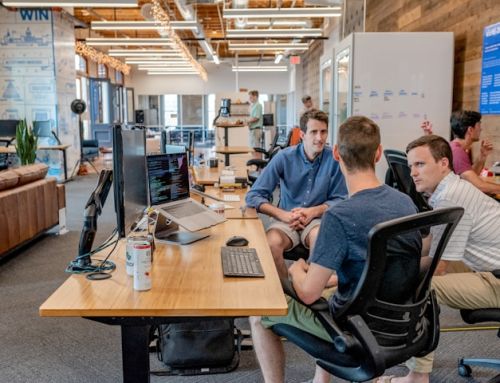Artificial Intelligence (AI) has revolutionized business activities by helping managers save costs and make better decisions. A survey by Gartner shows that the number of companies implementing AI-related technologies has risen by 270 percent in the past four years.
Those in the recruitment department use AI to expedite the recruitment process and provide more efficient hires. The candidates you hire to fill vacant positions in your organization will either propel your venture to enviable heights or break your effort. According to current estimates, the average cost of hiring a poor candidate can be as high as 30 percent of the worker’s first five-year earnings.
Many business owners realize the importance of hiring the best candidates and have turned to Artificial Intelligence (AI) to assist them in the recruitment process.
What is AI in Recruiting?
AI is the artificial intelligence of machines and computers programmed to imitate human action. Organizations are now using AI to carry out tasks usually performed by humans during the hiring process.
A report by the Guardian revealed how Unilever saved 100,000 hours of human recruitment time in one year by introducing AI into its recruitment process.
Below are some roles of AI technology in the recruitment process:
- Automate parts of the recruiting workflow
- Perform high-volume repetitive tasks
- Improve the applicants’ experience
- Help recruiters make better decisions
- Reduce human bias
- Reduce recruiting time
Although using AI in hiring has skyrocketed in recent years, many recruiters lack the skills to use it effectively in the recruitment process. The following are some ways to run an efficient recruitment process using AI.
Photo by Tara Winstead: https://www.pexels.com/photo/an-artificial-intelligence-illustration-on-the-wall-8849295/
Include Relevant Keywords
All AI recruitment tools run on applications. These applications have relevant keywords that guide the AI through the screening exercise. During hiring exercises, organizations use AI recruitment applications to screen candidates’ resumes by identifying targeted keywords.
Using AI in screening resumes means the application can only identify the keywords set out by the recruiters. AI can identify keywords through data imputed into the system to search for specific skills in a candidate’s resume.
Failure to include all the keywords relevant to a particular position will hinder the AI application from finding the best candidates for the job. To run an efficient recruitment exercise, you must be specific about the relevant keywords associated with the skills you want in a candidate.
Avoid Inherent AI Biases
There have been some notable examples of bias while using AI programs in recruitment. One such AI bias happened during Amazon’s recruitment in 2014. After using AI in their hiring process, Amazon found out that the program was biased against women.
There are many ways a bias can occur in AI. A recruiting bias can result from how you gather data and also from how you interpret data. Bias occurs when some prejudiced assumptions are included during the development of the AI algorithm.
Many businesses pay an enormous price for faulty algorithms caused by AI bias. When a bias is present in AI recruitment, it will eliminate some of the best candidates.
According to a current report, by 2030, about 85% of all AI projects will have some form of bias. To run an efficient recruitment process, you must devise a means to detect and eliminate human biases from creeping into your AI applications.
One way of eliminating bias in interpreting data during the recruitment process is to do a blind screening where some personal attributes of candidates will remain hidden. Another way to avoid bias in your recruiting process is to use only AI tools that have proven successful in eliminating bias.
Some experts have observed that it is difficult to eliminate bias from AI because it learns from inherently biased humans.
Don’t Eliminate Human Input.
Although AI has changed the recruitment process, it will be a huge mistake to rely completely on them throughout the hiring process. According to an investigation published in the Harvard Business Review, AI technology should not replace human capacities, but complement and augment them.
The purpose of AI in recruitment is not to remove people entirely from the process, but rather to access and process data at a pace humans will not be able to accomplish. While AI can handle data faster than people, there are areas in the recruitment process that require the input of human judgment.
Some experts believe that AI technology in recruitment is a developing field and still needs human involvement to function efficiently. The performance of AI algorithms improves when people are involved in the data gathering and validation process. Many recruiters choose to use linkedin for recruitment in the data gathering process as it’s a platform made specifically for the workforce to network and find jobs. Some studies reveal that candidates are skeptical about the fairness of AI hiring, and prefer one with human input.
Verify your Data
To solve a problem, AI requires a large amount of data as input to produce an output. The effectiveness of an AI system, therefore, depends on the quality of data imputed into it. Quality data must be accurate, consistent, complete, valid, and reliable as a genuine source of information.
Your AI algorithm is as good as the data imputed into it. It is, therefore, vital to use only validated data from a reliable source. Hiring managers must always identify what matters most to their organizations to avoid disqualifying suitable candidates from the recruitment process.
Recruitment involves a lot of questions about the advertised position, and many organizations use chatbots to interview candidates. If you use AI for interviews, the questions must relate to the advertised position.
Remember that whatever data or information you input into the AI algorithm will determine the quality of candidates that will be shortlisted. You will not run a successful recruitment process if you have a data set that does not properly represent the characteristics of the ideal candidate you want to employ. In recruitment, AI algorithms search the candidate’s resume for the skill set that the employer has identified for the advertised position.
Aim to Improve Integration
Most times, the effectiveness of AI in the recruitment process hinges on how it integrates with your HR system as a whole. By integrating AI into every aspect of the hiring process, the recruiter will arrive at a better decision in record time. The first step to properly integrating AI into your recruitment system is to define the hiring problems you want to solve.
Many organizations face recruiting challenges like:
- Scheduling interviews
- Employee referrals
- Screening candidates
- New employee onboarding
- Enabling new hire check-ins
There are many types of AI recruiting software. Look for one that can easily integrate with the system you have. For example, your AI recruitment tools should integrate with your existing internal communication system. It will be counter-productive to introduce an AI recruitment software that will disrupt rather than complement your current system.
Make your AI Recruitment Process Transparent.
Building trust among your workforce starts early during the recruitment process. Transparency in the recruitment process is a sign that the organization will also be transparent with employees.
You can be transparent by giving your candidates detailed information about the exact role AI will play in the recruitment process. Candidates can become suspicious of the actual intention of using AI in hiring if they do not know how the algorithm works.
Another way to entrench transparency in your AI recruitment is to explain how each candidate got selected. You can also be transparent in the hiring process by providing a full description of the advertised position and the benefits.
Conclusion
AI can only be effective when properly programmed and used in the hiring process. Running an efficient recruitment campaign with AI requires recognizing its potential and limits. The tips examined in this article are some of the proven ways to run an efficient recruitment process with artificial intelligence.






Leave A Comment